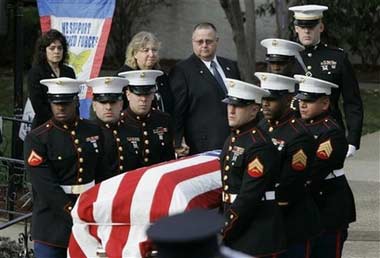Report casts military as war-weary
(AP)Updated: 2006-12-10 16:04
Washington - Beyond its prescriptions for fixing Iraq, the special commission that studied a new approach to the war also spotlighted less obvious military ills that have deepened as fighting has dragging on.
The military is war-weary, the defense budget is in danger of disarray, and relations between the military brass and their civilian overseers are frayed, the Iraq Study Group said. The bipartisan panel's report poses tough challenges for Robert Gates, who has no previous Pentagon management experience but will become defense secretary on Dec. 18.
According to the commission's assessment:
_The Bush administration's focus on Iraq has limited the military's effectiveness in Afghanistan.
_The Iraq war, playing out simultaneously with the fight in Afghanistan, has so strained the Army and Marine Corps that new attention, and billions of dollars, must be devoted to restoring the capabilities of the military so it is ready for conflicts of the future.
"US military forces, especially our ground forces, have been stretched nearly to the breaking point," the report said. This has made recruiting more difficult and accelerated wear on equipment, it said.
"Many units do not have fully functioning equipment for training when they redeploy to the United States," the study group said. "The American military has little reserve force to call on if it needs ground forces to respond to other crises around the world."
That statement referred to the possibility of conflict with Iran over its nuclear ambitions or North Korea, whose ballistic missiles and suspected nuclear weapons are considered a potential threat to US interests. But it could refer to the conflict in Afghanistan, which might require more US ground troops.
The report said the military's heavy focus on Iraq has limited its ability to succeed in Afghanistan. In the latter, the commission noted the radical Taliban militia that US forces ousted in the weeks after the attacks of Sept. 11, 2001, is reasserting itself and posing a renewed threat.
"The huge focus of US political, military and economic support on Iraq has necessarily diverted attention from Afghanistan," the report said, adding that as the Taliban regroups, the US should do more to stop it.
Resources now devoted to Iraq, including combat troops, might become available for Afghanistan if President Bush follows the commission's recommendation to pull out nearly all combat brigades from Iraq by early 2008, the report said. Bush has not said whether he would accept that recommendation.
Rep. Ike Skelton, who will become chairman of the House Armed Services Committee when Democrats take control of Congress in January, said Friday that Bush made the right decision to invade Afghanistan right after the Sept. 11 strikes, but then got distracted with Iraq.
"If we had put Iraq, that challenge, off and concentrated on Afghanistan ... I think we would be at or near a touchdown there," Skelton said in an interview taped for C-SPAN's "Newsmakers" program. "But, on the other hand, it's been forgotten," and US forces in Afghanistan are now stretched thin as the Taliban regains strength.
The Iraq Study Group also saw trouble inside the Pentagon.
The tradition of cooperation and open communication between senior military officers and their civilian Pentagon bosses has eroded, the commission said, under Defense Secretary Donald H. Rumsfeld, accused by some of treating generals harshly, even abusively.
The military has a long tradition of partnership between civilian leaders in the Pentagon and the uniformed services. The civilians in charge rely on candid advice from the military professionals; the officers submit to civilian control with the understanding that their advice has been heard and valued.
"That tradition has frayed, and civil-military relations need to be repaired," the commission concluded.
Without mentioning Rumsfeld by name, the commission called on his successor, Gates, to repair that damage.
The next defense secretary should make every effort to "build healthy civil-military relations by creating an environment in which the senior military feel free to offer independent advice," the report said.
In his Senate confirmation, Gates made a point of saying he would give the most serious consideration to the views of military commanders as he weighs recommendations to the White House on ways to improve the Iraq policy.
Michael Eisenstadt, adviser to the commission and director of the military and security program at the Washington Institute for Near East Policy, said he is hopeful that Gates will succeed in that effort.
"It could only get better," Eisenstadt said last week. "It couldn't be much worse than it has been under Rumsfeld."
|
||
|
||
|
|

